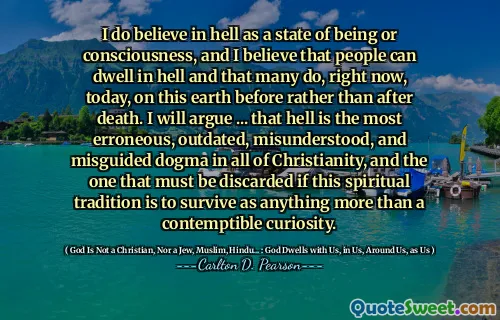
I do believe in hell as a state of being or consciousness, and I believe that people can dwell in hell and that many do, right now, today, on this earth before rather than after death. I will argue ... that hell is the most erroneous, outdated, misunderstood, and misguided dogma in all of Christianity, and the one that must be discarded if this spiritual tradition is to survive as anything more than a contemptible curiosity.
This quote challenges traditional Christian doctrines surrounding hell, suggesting that hell is not merely a place of eternal punishment after death but rather a state of consciousness that many experience in their daily lives. The idea shifts the perception from an external, punitive realm to an internal or situational reality that individuals may inhabit through their thoughts, behaviors, or societal circumstances. By framing hell as a misguided dogma that hampers spiritual growth, the author advocates for a reevaluation of these beliefs to ensure the survival and relevance of Christianity in contemporary thought.
From this perspective, hell becomes a metaphor for personal suffering, guilt, or societal injustice—conditions that can be mitigated through compassion, understanding, and spiritual awakening. This interpretation calls for a more compassionate and nuanced understanding of human experience, emphasizing that suffering is not exclusively tied to an afterlife but is often rooted in present-day circumstances and internal states.
Furthermore, dismissing the traditional dogma of hell opens the door for a more inclusive and less judgmental view of spirituality. It encourages believers to focus on transforming their consciousness and improving the world around them rather than fearing eternal punishment. This perspective aligns with spiritual teachings that emphasize love, inner peace, and active compassion rather than fear-based obedience.
Overall, the quote invites us to examine deeply held religious beliefs, question their relevance and impact, and consider more compassionate and enlightened approaches to spirituality that promote healing and unity rather than division and fear.


